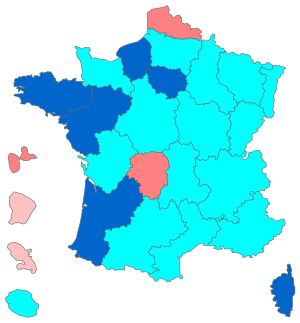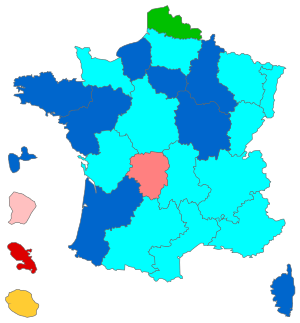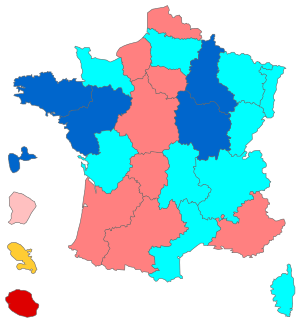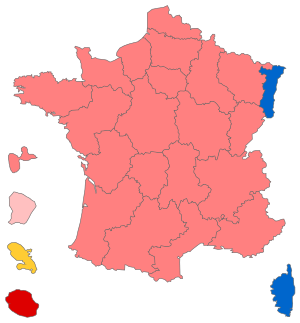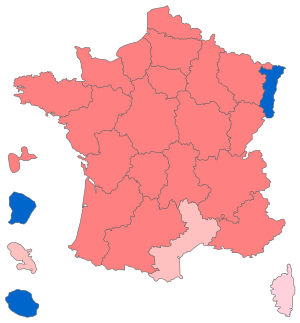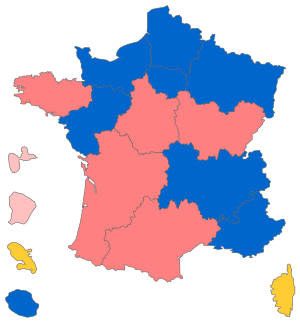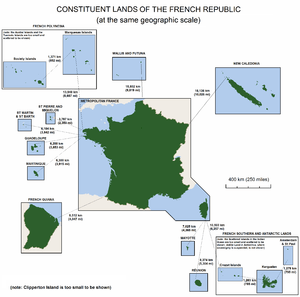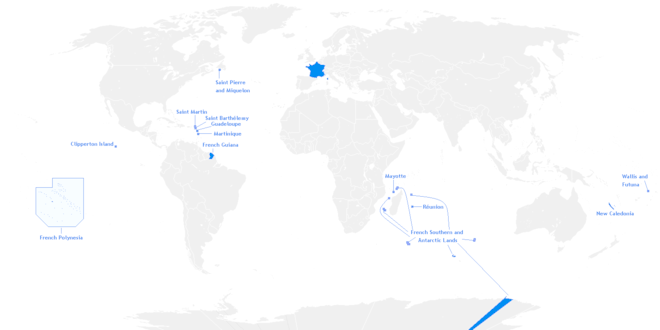Regions of France
France is divided into 18 administrative regions (French: régions, singular région [ʁeʒjɔ̃]), of which 13 are located in metropolitan France (i.e. on the European continent), while the other five are overseas regions (not be confused with the "overseas collectivities", which have a semi-autonomous status).[1]
| Region Région (French) | |
|---|---|
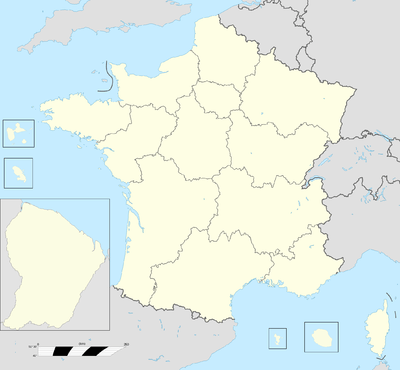 | |
| Category | Unitary republic |
| Location | France |
| Number | 18 |
| Possible status | Overseas region (région d'outre-mer) (5) |
| Additional status | Territorial collectivity (collectivité territoriale) |
| Populations | 279,471 (Mayotte) – 12,278,210 (Île-de-France) |
| Areas | 376 km2 (145 sq mi) (Mayotte) – 84,061 km2 (32,456 sq mi) (Nouvelle-Aquitaine) |
| Government | Regional Government, National Government |
| Subdivisions | Department |
| This article is part of a series on the |
| Administrative divisions of France |
|---|
| Administrative divisions |
| Intercommunality |
| Communes |
| Overseas France |
All 13 mainland administrative regions (including Corsica as of 2019) are further subdivided into 2 to 13 administrative departments, with the prefect of each region's administrative center's department also acting as the regional prefect. The overseas regions administratively consist of only one department each and hence also have the status of "overseas departments".
Most administrative regions also have the status of regional "territorial collectivities", which comes with a local government, with departmental and communal collectivities below the region level. The exceptions are Corsica, the French Guiana, Mayotte, and Martinique, where region and department functions are managed by single local governments having consolidated jurisdiction, and which are known as "single territorial collectivities".
History
1982–2015
The term région was officially created by the Law of Decentralisation (2 March 1982), which also gave regions their legal status. The first direct elections for regional representatives took place on 16 March 1986.[2]
Between 1982 and 2015, there were 22 regions in Metropolitan France. Before 2011, there were four overseas regions (French Guiana, Guadeloupe, Martinique, and Réunion); in 2011 Mayotte became the fifth.
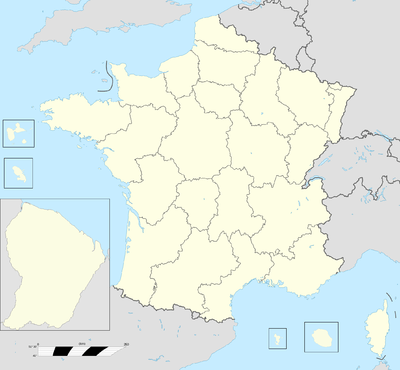 |
| Flag[3] | Region | French name | Other local name(s) | Capital | INSEE No.[1] | Derivation or etymology |
|---|---|---|---|---|---|---|
| Alsace | Alsace | Alsatian: Elsàss German: Elsass |
Strasbourg | 42 | Formerly a coalition of free cities in Holy Roman Empire, attached to Kingdom of France in 1648; annexed by Germany from Franco-Prussian war to the end of World War I and briefly during World War II | |
| Aquitaine | Aquitaine | Occitan: Aquitània Basque: Akitania Saintongeais : Aguiéne |
Bordeaux | 72 | Guyenne and Gascony | |
| Auvergne | Auvergne | Occitan: Auvèrnhe / Auvèrnha | Clermont-Ferrand | 83 | Former province of Auvergne | |
| Brittany | Bretagne | Breton: Breizh Gallo: Bertaèyn |
Rennes | 53 | Duchy of Brittany | |
| Burgundy | Bourgogne | Burgundian: Bregogne / Borgoégne Arpitan: Borgogne |
Dijon | 26 | Duchy of Burgundy | |
| Centre-Val de Loire[4] | Centre-Val de Loire | Orléans | 24 | Located in north-central France; straddles the middle of the Loire Valley | ||
| Champagne-Ardenne | Champagne-Ardenne | Châlons-en- Champagne |
21 | Former province of Champagne | ||
| Franche-Comté | Franche-Comté | Franc-Comtois: Fràntche-Comté Arpitan: Franche-Comtât |
Besançon | 43 | Free County of Burgundy (Franche-Comté) | |
| Île-de-France | Île-de-France | Paris | 11 | Province of Île-de-France and parts of the former province of Champagne | ||
| Languedoc-Roussillon | Languedoc-Roussillon | Occitan: Lengadòc-Rosselhon Catalan: Llenguadoc-Rosselló |
Montpellier | 91 | Former provinces of Languedoc and Roussillon | |
| Limousin | Limousin | Occitan: Lemosin | Limoges | 74 | Former province of Limousin and parts of Marche, Berry, Auvergne, Poitou and Angoumois | |
| Lorraine | Lorraine | German: Lothringen Lorraine Franconian: Lottringe |
Metz | 41 | Named for Charlemagne's son Lothair I, the kingdom of Lotharingia is etymologically the source for the name Lorraine (duchy), Lothringen (German), Lottringe (Lorraine Franconian) | |
| Lower Normandy | Basse-Normandie | Norman: Basse-Normaundie | Caen | 25 | Western half of former province of Normandy | |
| Midi-Pyrénées | Midi-Pyrénées | Occitan: Miègjorn-Pirenèus Occitan: Mieidia-Pirenèus |
Toulouse | 73 | None; created for Toulouse | |
| Nord-Pas-de-Calais | Nord-Pas-de-Calais | Lille | 31 | Nord and Pas-de-Calais departments | ||
| Pays de la Loire | Pays de la Loire | Breton: Broioù al Liger | Nantes | 52 | None; created for Nantes | |
| Picardy | Picardie | Amiens | 22 | Former province of Picardy | ||
| Poitou-Charentes | Poitou-Charentes | Occitan: Peitau-Charantas Poitevin and Saintongeais : Poetou-Chérentes |
Poitiers | 54 | Former provinces of Angoumois, Aunis, Poitou and Saintonge | |
| Provence-Alpes-Côte d'Azur (PACA) | Provence-Alpes-Côte d'Azur (PACA) | Provençal: Provença-Aups-Còsta d'Azur (Prouvènço-Aup-Costo d'Azur) |
Marseille | 93 | Former province of Provence | |
| Rhône-Alpes | Rhône-Alpes | Arpitan: Rôno-Arpes Occitan: Ròse Aups |
Lyon | 82 | Created for Lyon from Dauphiné and Lyonnais provinces and Savoy | |
| Upper Normandy | Haute-Normandie | Norman: Ĥâote-Normaundie | Rouen | 23 | Eastern half of former province of Normandy |
Reform and mergers of regions
In 2014, the French parliament passed a law reducing the number of metropolitan regions from 22 to 13 effective 1 January 2016.[5]
The law gave interim names for most of the new regions by combining the names of the former regions, e.g. the region composed of Aquitaine, Poitou-Charentes and Limousin was temporarily called Aquitaine-Limousin-Poitou-Charentes. However, the combined region of Upper and Lower Normandy is simply called "Normandy" (Normandie). Permanent names were proposed by the new regional councils by 1 July 2016 and new names confirmed by the Conseil d'État by 30 September 2016.[6][7] The legislation defining the new regions also allowed the Centre region to officially change its name to "Centre-Val de Loire" with effect from January 2015.[8] Two regions, Auvergne-Rhône-Alpes and Bourgogne-Franche-Comté, opted to retain their interim names.[9][10]
- Overview of merger proposals for the metropolitan territory
_map.svg.png) Édouard Balladur's proposal
Édouard Balladur's proposal_map.svg.png) Manuel Valls's proposal A
Manuel Valls's proposal A_map2.svg.png) Manuel Valls's proposal B
Manuel Valls's proposal B_map3.svg.png) President François Hollande's proposal
President François Hollande's proposal Regions as instituted by the National Assembly in 2014
Regions as instituted by the National Assembly in 2014
|
Regions that merged:
| |||||||||||||||||||||||||||||||||||||||||
|
Regions that remained unchanged:
| |||||||||||||||||||||||||||||||||||||||||
List of administrative regions
| Type | Region | Other local name(s) | Capital | Area (km2) | INSEE No.[11] | Former regions (until 2016) | President of the corresponding territorial collectivity's legislature | Location |
|---|---|---|---|---|---|---|---|---|
| Mainland region | Auvergne-Rhône-Alpes (Auvergne-Rhône-Alps) |
Occitan: Auvèrnhe-Ròse-Aups Arpitan: Ôvèrgne-Rôno-Arpes |
Lyon | 69,711 | 84 | Auvergne Rhône-Alpes |
Laurent Wauquiez (LR) | 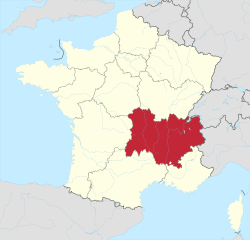 |
| Mainland region | Bourgogne-Franche-Comté (Burgundy-Free County) |
Arpitan: Borgogne-Franche-Comtât | Dijon | 47,784 | 27 | Burgundy Franche-Comté |
Marie-Guite Dufay (PS) | 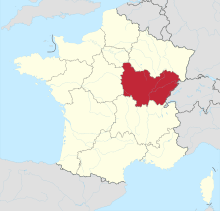 |
| Mainland region | Bretagne (Brittany) |
Breton: Breizh Gallo: Bertaèyn |
Rennes | 27,208 | 53 | unchanged | Loïg Chesnais-Girard (PS) | 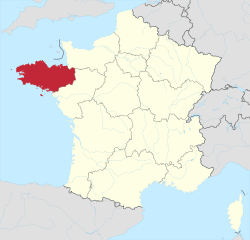 |
| Mainland region | Centre-Val de Loire[4] (Centre-Loire Valley) | Orléans | 39,151 | 24 | Centre | François Bonneau (PS) | 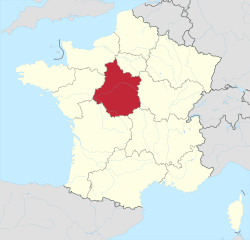 | |
| Mainland region | Corse (Corsica) |
Corsican: Corsica | Ajaccio | 8,680 | 94 | unchanged | Jean-Guy Talamoni (CL) | 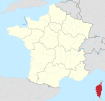 |
| Mainland region | Grand Est (Great East) |
German: Großer Osten | Strasbourg | 57,441 | 44 | Alsace Champagne-Ardenne Lorraine |
Jean Rottner (LR) | 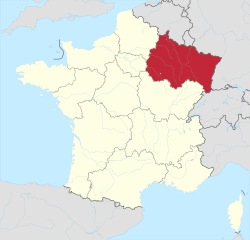 |
| Mainland region | Hauts-de-France (Upper France) |
Lille | 31,806 | 32 | Nord-Pas-de-Calais Picardy |
Xavier Bertrand (LR) | 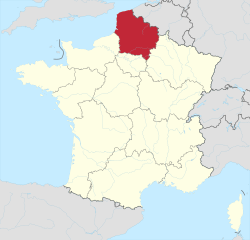 | |
| Mainland region | Île-de-France (Island of France) |
Paris | 12,011 | 11 | unchanged | Valérie Pécresse (LR) | 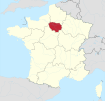 | |
| Mainland region | Normandie (Normandy) |
Norman: Normaundie | Rouen | 29,907 | 28 | Upper Normandy Lower Normandy |
Hervé Morin (LC) | 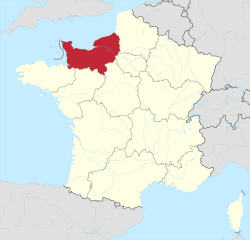 |
| Mainland region | Nouvelle-Aquitaine (New Aquitaine) |
Occitan: Nòva Aquitània / Nava Aquitània / Novela Aquitània Basque: Akitania Berria |
Bordeaux | 84,036 | 75 | Aquitaine Limousin Poitou-Charentes |
Alain Rousset (PS) | 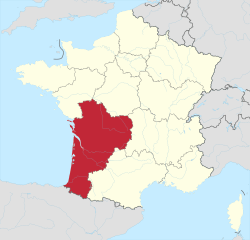 |
| Mainland region | Occitanie | Occitan: Occitània Catalan: Occitània |
Toulouse | 72,724 | 76 | Languedoc-Roussillon Midi-Pyrénées |
Carole Delga (PS) | 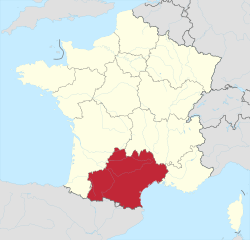 |
| Mainland region | Pays de la Loire (Loire Countries) |
Breton: Broioù al Liger | Nantes | 32,082 | 52 | unchanged | Christelle Morançais (LR) | 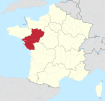 |
| Mainland region | Provence-Alpes-Côte d'Azur (Provence-Alps-Azure Coast) |
Provençal: Provença-Aups-Còsta d'Azur (Prouvènço-Aup-Costo d'Azur) |
Marseille | 31,400 | 93 | unchanged | Renaud Muselier (LR) | 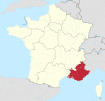 |
| Overseas region | Guadeloupe | Antillean Creole: Gwadloup | Basse-Terre | 1,628 | 01 | unchanged | Ary Chalus (GUSR) | 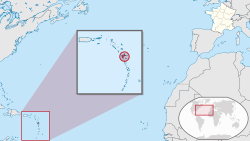 |
| Overseas region | Guyane (French Guiana) |
Cayenne | 83,534 | 03 | unchanged | Rodolphe Alexandre (PSG) | 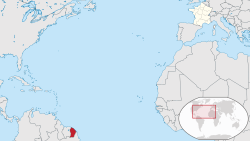 | |
| Overseas region | La Réunion (Réunion) |
Reunion Creole: La Rényon | Saint-Denis | 2,504 | 04 | unchanged | Didier Robert (LR) |  |
| Overseas region | Martinique | Antillean Creole: Matinik | Fort-de-France | 1,128 | 02 | unchanged | Claude Lise (RDM) | 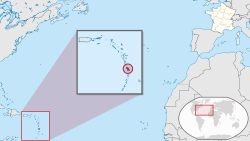 |
| Overseas region | Mayotte | Shimaore: Maore Malagasy: Mahori |
Mamoudzou | 374 | 06 | unchanged | Soibahadine Ibrahim Ramadani (LR) |  |
Role
Regions lack separate legislative authority and therefore cannot write their own statutory law. They levy their own taxes and, in return, receive a decreasing part of their budget from the central government, which gives them a portion of the taxes it levies. They also have considerable budgets managed by a regional council (conseil régional) made up of representatives voted into office in regional elections.
A region's primary responsibility is to build and furnish high schools. In March 2004, the French central government unveiled a controversial plan to transfer regulation of certain categories of non-teaching school staff to the regional authorities. Critics of this plan contended that tax revenue was insufficient to pay for the resulting costs, and that such measures would increase regional inequalities.
In addition, regions have considerable discretionary power over infrastructural spending, e.g., education, public transit, universities and research, and assistance to business owners. This has meant that the heads of wealthy regions such as Île-de-France or Rhône-Alpes can be high-profile positions.
Proposals to give regions limited legislative autonomy have met with considerable resistance; others propose transferring certain powers from the departments to their respective regions, leaving the former with limited authority.
Overseas regions
Overseas region (French: Région d'outre-mer) is a recent designation, given to the overseas departments that have similar powers to those of the regions of metropolitan France. As integral parts of the French Republic, they are represented in the National Assembly, Senate and Economic and Social Council, elect a Member of the European Parliament (MEP) and use the euro as their currency.
Although these territories have had these political powers since 1982, when France's decentralisation policy dictated that they be given elected regional councils along with other regional powers, the designation overseas regions dates only to the 2003 constitutional change; indeed, the new wording of the constitution aims to give no precedence to either appellation overseas department or overseas region, although the second is still virtually unused by French media.
The following have overseas region status:
- in the Indian Ocean (Africa):
- in the Americas:
- French Guiana in South America
- Guadeloupe in the Antilles (Caribbean)
- Martinique in the Antilles (Caribbean)
- ^ Saint Pierre and Miquelon (off Canada, in North America), once an overseas department, was demoted to a territorial collectivity in 1985.
See also
- List of current presidents of the regional councils of France and the Corsican Assembly
- Ranked list of French regions
- Administrative divisions of France
- List of French regions and overseas collectivities by GDP
- List of French regions by Human Development Index
- List of regions of France by population
- Flags of the regions of France
- ISO 3166-2:FR
General:
- Decentralisation in France
- Budget of France
- Regional councils of France
- Administrative divisions of France
- Overseas
References
- "Carte des Régions" (in French). INSEE. Retrieved 29 September 2009.
- Jean-Marie Miossec (2009), Géohistoire de la régionalisation en France, Paris: Presses universitaires de France ISBN 978-2-13-056665-6.
- These flags are not official.
- New name as of 17 January 2015; formerly named Centre.
- La carte à 13 régions définitivement adoptée, Le Monde, 17 December 2014, accessed 2 January 2015
- Quel nom pour la nouvelle région ? Vous avez choisi..., Sud-Ouest, 4 December 2014, accessed 2 January 2015
- "Nouveau nom de la région : dernier jour de vote, Occitanie en tête". midilibre.fr.
- "Journal officiel of 17 January 2015". Légifrance (in French). 17 January 2015. Retrieved 10 March 2015.
- "Auvergne-Rhône-Alpes : fini la consultation, Laurent Wauquiez a tranché - Place Gre'net". placegrenet.fr. 31 May 2016.
- "Région Bourgogne-Franche-Comté". www.bourgognefranchecomte.fr.
- "La nouvelle nomenclature des codes régions" (in French). INSEE. Retrieved 17 January 2016.
External links
- Regions of France at Curlie
- Guide to the regions of France
- Local websites by region
- Will 2010 regional elections lead to political shake-up? Radio France Internationale in English
- Overseas regions
